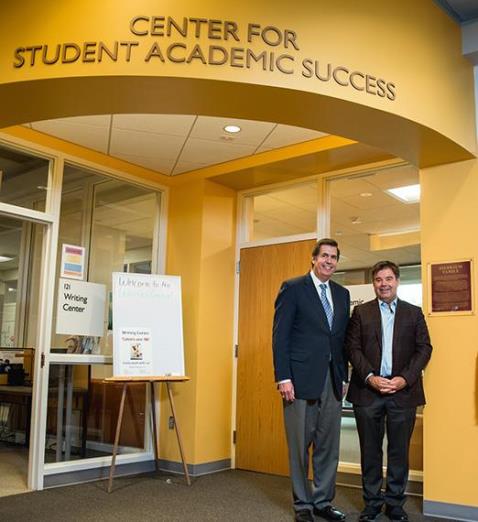Gonzaga Offers Students Support During COVID-19

Gonzaga’s mission of caring for the whole person is vividly demonstrated in those programs that directly support student success.
That focus didn’t change when the majority of students had to leave campus due to the COVID-19 outbreak and undergraduate classes shifted to a virtual environment. The Center for Student Academic Success (CSAS) pivoted quickly to fill needs that are most often met in-person.
“We took all of our work and moved it online. My team was so willing and capable of helping with this lift,” said Deborah Stevenson, CSAS director. “Fortunately, we’ve done a lot of work on cohesiveness, diversity, inclusion, development and leadership over the past few years.”
The center provides a diverse set of services for students, including: advising, coaching, learning strategies and tutoring, accommodations for students with disabilities. They work over the full spectrum of a student’s journey, both before and during their time at Gonzaga.
CSAS staff consults with incoming freshman and transfer students on their first-year semester schedules to help them get off to a good start academically. They also regularly answer family inquiries and participated in this spring’s “Virtual GEL” event hosted by the university.
This spring, they continued to walk alongside students who were struggling before COVID-19 or its aftermath. The office’s work can be challenging in times like these, but is never done alone. A culture of collaboration at Gonzaga exists between stakeholders such as faculty, and staff.
“We’ve had to work very closely with colleagues across campus,” said Stevenson. “I don’t think I’ve ever started a program or built an initiative without partners, especially faculty.”
If a student is struggling, it is often faculty members who are in the best position to notice. If a faculty member is concerned about a student due to disengagement demonstrated in the academic setting, they can make a referral to the campus-wide SOS program.
The University saw an increase in referrals after the onset of COVID-19, due to the sudden change in every aspect of most students’ lives – including the rapid transition of all undergraduate classes to online. An interdisciplinary team responded immediately.
CSAS continued serving students, migrating some systems to virtual platforms such as Zoom and increasing check-ins by email and phone. Additionally, some features of GU’s online learning management system help to identify needs and measure outcomes. Those data points can be coordinated alongside outreach outcomes and other trends to provide helpful insights.
“That is now highly predictive data for us,” said Stevenson. “This was valuable because we couldn’t physically see students around campus anymore to see how they were doing.”
There were other benefits derived from more undergraduate classes being offered virtually. As an example, the array of learning management tools helps to level the playing field for students whose learning styles may better suited to virtual versus in-person classes. A remote environment can remove some of the barriers of a physical classroom environment. The online tools also raised awareness of accessibility issues and how to remediate content. Those learnings will continue to prove beneficial for faculty, staff and students alike.
“This opens up opportunities to teach classes in new ways,” said Stevenson, whose office is continuing to survey students and faculty on their preferences going forward.
In retrospect, the CSAS team saw the challenge of COVID-19 as an opportunity for growth. The goal of the office and its partners remains the same: to make the learning and living experience at Gonzaga as successful as possible for everyone.
